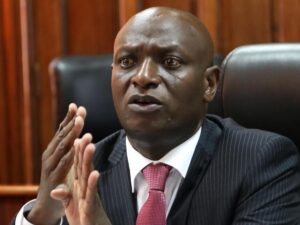Diesel prices are expected to fall by nearly Sh20 per litre on Thursday, the largest margin in 13 years as motorists are will enjoy cheaper super petrol whose price at the pump will fall by Sh10.59 a litre on lower global crude oil prices.
A brief sent to the Petroleum Ministry by the energy regulator shows that the pump price of diesel will be down to Sh78.07 per litre in Nairobi, up from Sh97.56, representing a 19.9% drop.
Motorists in Nairobi will pay Sh82.28 for a litre of super petrol at the pump, up from Sh92.87 while kerosene costs will increase to Sh79.79 from Sh76.60.
The prices were expected to fall even deeper but thenew levies imposed on fuel last month after changes in the laws that also introduced tax reliefs to protect the economy against the wrath of the global covid-19 pandemic.
The new laws requires for other fuel levies, including road maintenance, railway development and regulatory fees to be included in the calculation of value-added tax (VAT) to pump in billions of shillings to State coffers.
Before the changes in law, the duties and levies adding to Sh41.19 per litre of fuel did not attract the eight percent VAT but the changes will now add up to Sh3.30 a litre on fuel prices from friday.
It is the prerogatitive of the Energy and Petroleum Regulatory Authority (EPRA) to set maximum retail prices for petrol, diesel and kerosene on 15th of every month in controls imposed since late 2010 after a surge in retail fuel prices.
The cheaper fuel is las a result of plunge in crude oil prices after a fallout between Saudi Arabia and Russia to reduce production after Covid-19 pandemic reduced economic activities and demand for energy.

Last month, Petrol prices dropped by Sh18 but prices that will apply at the pump after today’s review will be the lowest in nearly 50 months.
Energy and transport costs have a significant weight among goods and services any economy or state may use to measure inflation in the country.
Prviders of services as electricity and manufactured goods are also expected to consider lower cost of petroleum to lower prices across the economy with ramifications on the cost of living measure.
Many kenyan households still rely heavily on kerosene and gas for lighting and cooking which makes crude price a key determinant of inflation rate.
Diesel is used for transportation, power generation and running of agricultural machineries as tractors which later has a direct effect on the cost of agricultural produce.
Inflation has gone up from 5.51% in March to 5.62 % due to increase in food prices.
In the global market, crude prices are averagely $26.63 per barrel compared to $35.58 a barrel that EPRA has used to review the April retail prices and $56.10 for March.
Earlier in the week The Petroleum ministry rejected a petition from oil marketers for exclusion of cheaper fuel in the review of monthly fuel for May which will deny the motorists benefits of low crude prices.
Marketers demand the energy regulator to base its review of retail fuel prices starting May 15 mainly on the March crude cost of $35.58 a barrel because they were unable to sell 40% of the expensive fuel because of Covid-19 restriction.
EPRA warned that fuel prices would have changed if the State yielded to the marketers’ pressure to include 40% of expensive unsold fuel meant for consumption in the month to May 14 in the monthly review and exclusion of cheaper shipments. ,
The State imposed a daily dusk-to-dawn curfew and barred movements into and out of Kenya’s five counties that have been worst hit by the Covid-19 pandemic, including Nairobi Mombasa, Kilifi, Kwale and Mandera.
These restrictions have negatively affected the demand for diesel and petrol.
Dealers were pushing for retail price cuts to be delayed to allow them exhaust the stock they took in March as they may incur losses adding to billions if prices are reduced today.



















